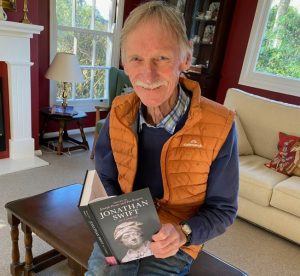Clive Probyn

Emeritus Professor Clive Probyn
- Post Nominals: FAHA, OAM
- Fellow Type: Fellow
- Elected to the Academy: 1992
- Section(s): English
Biography
Clive Probyn, BA, MA, PhD, FAHA, OAM, Professor of English at Monash University, Victoria, Australia from 1982 to 2009, and now Emeritus Professor of English, has been a full-time senior university academic since 1968, establishing and teaching English, African and Australian literary studies on four continents. He was educated at Wyggeston Grammar Schoool, Leicester, studied and later taught at Nottingam University and the University of Virginia, where he was a Fulbright Scholar. He taught at Lancaster University UK between 1968 and 1982, and was then appointed to the Chair of English at Monash University, Victoria, Australia. He established English, Law, and French departments at Sokoto University (later Usman dan Fodio University) in north-western Nigeria, where he was Professor of English and founding Dean of Arts and Islamic Studies.
In 1992 he was elected a Fellow of the Australian Academy of the Humanities. In 2003 he was awarded the Centennial Medal for service to English and Australian Literature. In September 2023 he received the OAM, the Gold Medal in the Order of Australia (General Division) for his contribution to Australian tertiary education.
He is the author and/ or editor of more than twenty books, including four on Jonathan Swift (1978, 1978, 1987, 2020), English Fiction of the Eighteenth Century (Longman, 1987), English Poetry (Longman, 1984), a biography of James Harris (The Sociable Humanist . . . Provincial and Metropolitan Culture in Eighteenth Century England (Clarendon Press, Oxford, 1991), editor and contributor, The Art of Jonathan Swift, Vision Press, London, 1978; co-editor with Martin Battestin of The Correspondence of Henry and Sarah Fielding (Clarendon Press, Oxford, 1993), author of many articles on eighteenth century English culture, several on Australian topics and several short book-length studies on West African writers (1981-2: Achebe, Okara, Soyinka).
In Australian literary studies he has co-edited three volumes of letters by the Australian novelist Henry Handel Richardson (Melbourne University Press, 2000-1), judged ‘An Outstanding Contribution to Australian Culture, 2000’ by the Centre for Australian Cultural Studies National Awards Committee, Canberra). In addition he has co-edited and published research editions of her six novels: Maurice Guest, The Getting of Wisdom, The Fortunes of Richard Mahony, The Young Cosima, and an edition of Richardson’s translation from the Danish of Jacobsen’s Niels Lyhne (2003). This is to date the largest single project in the history of Australian studies, producing a total of thirteen volumes (including two volumes of her music), generously supported by the Australian Research Council, Dame Elisabeth Murdoch, DBE, and Monash University. He has supervised many Australian PhD students.
Outside the academy he co-founded and served as President of the Henry Handel Richardson Society of Australia. He also co-founded the Samuel Johnson Society of Australia and was its first president. He is the literary executor of the Henry Handel Richardson estate and has given lectures to interested groups of readers, including the Royal Society of New South Wales, the Australian Irish Studies association, and the Savage Club of Melbourne.
He is interested in ways of re-reading the English eighteenth century, as in ‘Paradise and Cotton-mill: Rereading Eighteenth Century Romance’ in the Blackwell Companion to Romance (2004) and ‘Blindness and Insight: The World, the Text (of Jonathan Swift), and the Criticism of Edward Said’ Eighteenth-Century Life (2008).
He wrote the new major entry for Swift and four others in the Oxford Dictionary of National Biography, and is an Advisory Board member of the Ehrenpreis Center for Swift Studies, Münster, Germany. His recent work appears in the first five volumes of the Münster Swift Symposium papers, ed. Hermann Real and others. His most recent book is on the relationships between biography and geography, cartography, travel-writing, diary writing, and spatial history in the early Enlightenment: Jonathan Swift on the Anglo-Irish Road (320 pages, Fink/Brill, Paderborn, 2020). He has recently been described as ‘one of . . . the most illuminating and illustrious of Swiftians’ (John Stubbs: 2016, p. 714).
